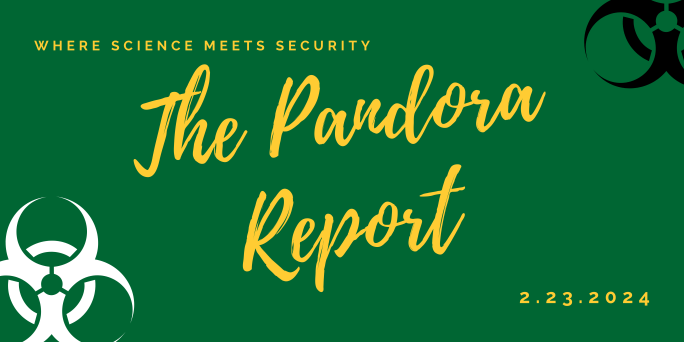This edition covers recent nuclear material trafficking charges against yakuza leader Takeshi Ebisawa, a new collaboration between NIST and EBRC, new publications, upcoming events, a new professional opportunity, and an opportunity to participate in One Health-related research.
US Attorney Announces Nuclear Material Trafficking Charges Against Yakuza Leader
The US Attorney’s Office for the Southern District of New York announced this week charges against Takeshi Ebisawa, a Japanese national and yakuza leader, alleging that Ebisawa and his co-defendant (Somphop Singhasiri) trafficked nuclear materials from Burma to other countries, including Thailand. The materials include uranium and weapons-grade plutonium. According to the Department of Justice’s press release, Ebisawa was charged “…with conspiring with a network of associates to traffic nuclear materials from Burma to other countries. In the course of this conspiracy, EBISAWA and his confederates showed samples of nuclear materials in Thailand to a DEA undercover agent (“UC-1”), who was posing as a narcotics and weapons trafficker. With the assistance of Thai authorities, the nuclear samples were seized and subsequently transferred to the custody of U.S. law enforcement. A U.S. nuclear forensic laboratory later analyzed the samples and confirmed that the samples contain uranium and weapons-grade plutonium.”
The statement later explained that “DEA Administrator Anne Milgram said: “As alleged, the defendants in this case trafficked in drugs, weapons, and nuclear material — going so far as to offer uranium and weapons-grade plutonium fully expecting that Iran would use it for nuclear weapons. This is an extraordinary example of the depravity of drug traffickers who operate with total disregard for human life. I commend the men and women of DEA and this prosecution team for their tireless work to protect us from such evil.”’
Furthermore, US Attorney Damian Williams said in a statement, “It is impossible to overstate the seriousness of the conduct alleged in today’s Indictment. As alleged, Takeshi Ebisawa brazenly trafficked material containing uranium and weapons-grade plutonium from Burma to other countries. He allegedly did so while believing that the material was going to be used in the development of a nuclear weapons program, and the weapons-grade plutonium he trafficked, if produced in sufficient quantities, could have been used for that purpose. Even as he allegedly attempted to sell nuclear materials, Ebisawa also negotiated for the purchase of deadly weapons, including surface-to-air missiles. I want to thank the career prosecutors of my Office and our law enforcement partners for their unwavering commitment to protecting our national security by ensuring that the defendant will now face justice in an American court.”’
NTI Launches International Biosecurity and Biosafety Initiative for Science
Last week, the Nuclear Threat Initiative (NTI) Launched the International Biosecurity and Biosafety Initiative for Science (IBBIS), “a first-of-its-kind organization to strengthen international biosecurity governance. IBBIS, an independent organization to be headquartered in Geneva, provides tools that will allow technological innovation to flourish, safely and responsibly.”
The organization explained in a press release, “Until now, there has been no organization solely dedicated to safeguarding the tools of modern bioscience and biotechnology from deliberate or accidental misuse. NTI identified this gap and worked with international partners to establish IBBIS and launch it today during an event on the margins of the Munich Security Conference. Piers Millett, Ph.D., serves as the inaugural executive director, and IBBIS has an international advisory group, which includes Nisreen AL-Hmoud from Jordan, Lela Bakanidze from Georgia, Rik Bleijs from the Netherlands, Luis Carrera from the United States, Genya Dana from the United States, O’Neil Hamilton from Jamaica, Aamer Ikram from Pakistan, Angela Kane from Germany, Irma Makalinao from the Philippines, Talkmore Maruta from Zambia, Suryesh Namdeo from India, Harawati Sudoyo from Indonesia, and Weiwen Zhang from China.”
“IBBIS will collaborate with governments, international organizations, industry and academia to develop and promote practical, innovative tools that stakeholders can use to reduce risks throughout the bioscience and biotechnology research and development lifecycle. The first of such tools is now available—a new Common Mechanism software tool for DNA synthesis providers that enables them to cost effectively screen DNA orders and customers to ensure that the building blocks of dangerous pathogens do not fall into the hands of malicious actors.”
Read more about the organization here.
NIST Announces Two-Year Agreement with Engineering Biology Research Consortium to Help Combat AI Risks
The US Department of Commerce’s National Institute of Standards and Technology (NIST) recently announced it has entered into a two-year cooperative research agreement with a nonprofit organization, the Engineering Biology Research Consortium (EBRC). The agreement aims to develop screening and safety tools that will help defend against the potential misuse of AI as it relates to nucleic acid synthesis. NIST explained in a press release about the agreement, “NIST initiated this collaboration to fulfill a task within the recent Executive Order on Safe, Secure, and Trustworthy Artificial Intelligence that charges multiple agencies — including NIST — with developing standards, best practices and implementation guides for nucleic acid synthesis, in light of advances in AI. The Executive Order on AI calls on NIST to initiate an effort to engage with industry and other stakeholders to develop safeguards to defend against potential misuse of AI related to the synthesis of genetic material. NIST will work with EBRC to identify best practices and policies to ensure public safety.”

“Putin Critic Alexei Nevaly, Who Once Survived a Chemical Weapons Attacks, Dies in a Russian Prison”
Matt Field discusses the death of Alexei Navalny in this piece for The Bulletin of the Atomic Scientists, writing in part “The Navalny poisoning has been taken as one of many examples of Putin’s efforts to erode norms around weapons of mass destruction. Since the Russian invasion of Ukraine, Putin and other government officials have repeatedly alluded to nuclear attacks and claimed, falsely, that the United States and Ukraine were developing biological weapons. “Navalny’s poisoning with a closely related Novichok agent less than a year after those changes were implemented was a vivid reminder that Russia remains in gross violation of the [Chemical Weapons Convention] and Putin’s willingness to brazenly flout international norms,” Gregory Koblentz, a professor of biodefense at George Mason University’s Schar School of Policy and Government who has followed the Navalny case, said.”
“Box the Pox: Reducing the Risk of Smallpox and Other Orthopoxviruses”
The Bipartisan Commission on Biodefense recently released this plan detailing “…how Alaskapox, smallpox, and other orthopoxviruses pose significant risks due to their potential for weaponization, accidental release, and vulnerability of populations who stopped routinely vaccinating against smallpox in the 1970s.”
According to the Commission’s press release, “Additionally, the Commission’s plan details why the Intelligence Community (IC) must reinvigorate its efforts to produce biological intelligence. Over the years since the United States ceased its own biological weapons program, the IC reduced its emphasis on the biological weapons threat. Today, however, the threat has never been greater. The growth of synthetic biology also means that even non-state actors could have the capacity to produce smallpox. The Commission recommends that the Central Intelligence Agency identify activities occurring in foreign laboratories involved in biological weapons research and determine the physical disposition of previously weaponized smallpox produced by the Former Soviet Union, among other intelligence actions. The Commission also recommends that the Department of Defense makes sure U.S. and allied military forces can fight and win in areas biologically contaminated with smallpox. This is no time to depend on old personal protective equipment and filters that wear out in days or weeks.”
“The Last of Us and the Question of a Fungal Pandemic in Real Life”
Georgios Pappas and Georgia Vrioni recently published this piece in Emerging Infectious Diseases, writing in their abstract: “The television series The Last of Us imagines a postapocalyptic world ravaged by a fungal pandemic caused by a Cordyceps species. We evaluate whether a fungal pandemic is possible (and reasons behind its current improbability). We further discuss the series’ effect on public perception of fungi, fungal infections, and pandemic response.”
“Biotech Matters: A U.S. National Security Imperative”
Hannah Kelley recently published this piece for CNAS, writing in part “Now more than ever, the international community needs what emerging biotechnologies promise to do—for health, climate, energy security, agriculture, supply chain resilience, and more. And to meet the moment, the United States must reassert its biotech leadership, not only for its own economic and national security, but to ensure that democratic principles underpin the global biorevolution.”
“‘There Are No Serious Safeguards’: Can 23andMe be Trusted With Our DNA?”
Alaina Demopoulos tackles safety and security questions regarding at-home genetic testing services like those provided by 23andMe for The Guardian in this piece. They write in part, “What’s next for 23andMe? Most people know the biotech company as a genetic testing service. Stories of people sending their cheek swabs off in the mail only to discover that a parent who raised them wasn’t their biological one have become a kind of millennial horror genre. Of course, most 23andMe experiences aren’t that dramatic: the company says more than 14 million people have used the service in hopes of learning more about their ancestry.”
“But this month, 23andMe revealed it is facing major financial troubles, and more information came to light about a devastating security breach at the company last year. Now, customers might be wondering: can they trust 23andMe with their DNA?”
What We’re Listening To 🎧
Conspiracy Theories-The 2001 Anthrax Attacks
This episode of the Conspiracy Theories podcast covers the Amerithrax attacks: “One week after the 9/11 terrorist attacks, someone began mailing envelopes containing a deadly form of anthrax, reigniting a national panic. The FBI spared no expense on the years-long investigation before naming a suspect and closing the case…but not everyone believes they got the right guy.”

GP Nonproliferation and Strategic Trade Hub Virtual Launch & Demo
“The Strategic Trade Research Institute (STRI) invites you to participate in the Global Partnership Nonproliferation and Strategic Trade Hub Virtual Launch and Demo event taking place on February 27, 2024, from 9:00-10:00 am EST.”
“Please join us to learn about the main features of the Hub, how to use it, and how it can be useful and impactful for nonproliferation and export control professionals. The event will feature Andrea Viski, Director of STRI, as well as introductory remarks from the Hub’s sponsor, the United Kingdom’s Counter-proliferation and Arms Control Center (CPACC).”
Learn more and register here.
International Conference, CBRNE Research & Innovation
“The last 40 years have demonstrated that both military and civilian populations could be exposed to highly hazardous CBRNE agents following conflicts, natural outbreaks and disasters, industrial incidents or terrorist attacks.”
“Worldwide, researchers, responders and industrial capacities have been commited to provide adapted response to these challenges.”
“Building on the success of the first 5 International Conferences « CBRNE Research and Innovation » which took place in Antibes (2015), Lyon (2017), Nantes (2019), on line (2021) and Lille (2022), we want to give you a new opportunity to build up or strengthen collaborative networks in Strabourg (March 19th – 21rst 2024).”
“The CBRNE R&I Conference is specifically devoted to scientific updates, responders’ feedbacks and expression of needs. It also includes workshops and demonstrations of innovative materials, technologies and procedures, according to the following themes: DETECTION – IDENTIFICATION, PROTECTION – DECONTAMINATION, MEDICAL COUNTERMEASURES, RISKS & CRISIS MANAGEMENT.”
“Looking forward to your proposals for communication and to welcoming you at Strasbourg in March 2024!”
Learn more here.
Artificial Intelligence and Automated Laboratories for Biotechnology: Leveraging Opportunities and Mitigating Risks
From the National Academies’ Board on Life Sciences: “Please join us April 3-4, 2024 for a hybrid workshop on the opportunities and mitigation of risks of the use of artificial intelligence and automated laboratories (i.e., self-driving labs) for biotechnology.”
“The workshop will consider opportunities to leverage AI and laboratory automation capabilities for discovery and development, explore methods and approaches to identify, track, and forecast the domestic and international development of such technologies, and convene experts across sectors to highlight recent advances and explore implications for the development and use of these technologies.”
Learn more and register here.
Launch of the 2024 National Blueprint on Biodefense
From the Bipartisan Commission on Biodefense: “On the 10th anniversary of its inception, the Bipartisan Commission on Biodefense will release its 2024 National Blueprint on Biodefense: Immediate Action Needed to Defend Against Biological Threats.”
“Please join us for this momentous event at the Congressional Auditorium, Capitol Visitor Center, on April 17th at 4:30pm.”
“The Bipartisan Commission on Biodefense (formerly the Blue Ribbon Study Panel on Biodefense) was established in 2014 to provide a comprehensive assessment of the state of United States biodefense efforts and to issue recommendations that foster change. Subsequently, the Commission has briefed White House Administrations (including then Vice President Biden); testified before Congress; convened numerous meetings with experts; released 12 reports; produced the graphic novel Germ Warfare; and mobilized biodefense conversations and actions in the private and public sectors.”
Learn more and register here.
Registration for GHS 2024 Now Open
Registration is now open for the Global Health Security 2024 conference in Sydney, Australia. This iteration will take place 18-21 June, 2024. The call for abstracts is also still open. “The mission of the Global Health Security conference is to provide a forum where leaders, researchers, policy-makers, and representatives from government, international organisations, civil society, and private industry from around the world can engage with each other, review the latest research and policy innovations, and agree solutions for making the world safer and healthier. To that end, our mission is to help foster a genuinely multidisciplinary community of practice that is committed to working collaboratively to enhance global health security and eliminate disease, irrespective of its origin or source.”
SBA.3 International Synthetic Biology, and Biosecurity Conference in Africa
“Join us for the SBA.3 International Synthetic Biology and Biosecurity Conference in Africa, a groundbreaking event that brings together experts, researchers, and enthusiasts in the field of synthetic biology. This in-person conference will take place at the Laico Regency Hotel from Wed, Jul 17, 2024 to Friday, Jul 19, 2024.”
“Get ready to dive into the exciting world of synthetic biology and explore its potential applications in Africa. From cutting-edge research to innovative solutions, this conference offers a unique opportunity to learn, network, and collaborate with like-minded individuals.”
“Discover the latest advancements, trends, and challenges in synthetic biology through engaging keynote speeches, interactive workshops, and thought-provoking panel discussions. Immerse yourself in a vibrant atmosphere where ideas flow freely and new connections are made.”
“Whether you’re a seasoned professional or just starting your journey in synthetic biology, this conference provides a platform to expand your knowledge, exchange ideas, and contribute to the growth of the field in Africa.”
“Don’t miss out on this extraordinary event that promises to shape the future of synthetic biology and biosecurity in Africa. Mark your calendars and join us at the SBA.3 International Synthetic Biology and Biosecurity Conference in Africa!”
Learn more and register here.

WHO Technical Working Group Expression of Interest: Rapid Response Capacities
The World Health Organization (WHO) is seeking expressions of interest from suitable experts across diverse health emergency networks to participate in a technical working group (TWG) to develop common guidance and benchmarks for the establishment of rapid response capacities, as part of the surge capacities pillar of the Global Health Emergency Corps (GHEC).
The vision of GHECis a well-coordinated health emergency workforce centred in countries that aims to stop the next pandemic and to strengthen health emergency response at all levels. It encompasses connected health emergency leadership, interoperable surge capacities, national public health and emergency workforce.
Within WHO, GHEC will convene a secretariat at global and regional levels to build on and connect existing health emergency networks and institutions, such as the Emergency Medical Teams (EMT), Global Outbreak Alert and Response Network (GOARN), Standby Partnership Network, International Association of National Public Health Institutes (IANPHI), Training Programs in Epidemiology and Public Health Interventions Network (TEPHINET), Public Health Emergency Operations Centre Network (EOC-NET), and Global Health Cluster. GHEC as a collaboration platform will collectively address the gaps exposed by the COVID-19 pandemic and other health emergencies by identifying best practices, shared learnings and areas for collaboration in strengthening the emergency workforce, surge capacities and connected leadership.
Rapid Response Capacities are the medical, healthcare and public health services and functions that can be deployed at short notice and on a non-routine basis to address health needs during and/or after a health emergency. This encompasses a wide range of capacities, including Emergency Medical Teams (EMTs), Specialized Care Teams, Public Health Rapid Response Teams, Mobile Laboratories, and Community-based interventions and resources.
The technical working group will be composed of a limited number of experts selected based on their experience in the areas relevant to the scope of work. Priority will be given to those experts experienced in setting up and/or managing any type of rapid response capacity in their countries. Membership will strive to be gender balanced with equal representation from the different regions.
We invite interested organizations to nominate individuals by filling the form below. Please note that the authorized representative of the organization/institution should be submitting the form. Shortlisted candidates will then be asked to submit a CV and sign a Declaration of Interest.
For further information, kindly refer to https://bit.ly/RRCtermsofreference. Working Group meetings will be held in English.
Deadline for submissions is 28 February 2024.
Research Study: Barriers to Diversity in International One Health Activities
“You and your network are invited to participate in a research study about participation in international One Health events and barriers to inclusion and diversity. This study is being conducted by Queensland University of Technology, Australia (QUT) with the aim of under-standing the main barriers that women and other underrepresented groups face in their participation in international One Health (OH) events. An international OH event is any event that brings together OH experts from different countries, and includes conferences, colloquiums, meetings and workshops. Understanding the importance of such barriers in the context of global and OH event participation and the strategies implemented to facilitate attendance is an intentional first step towards establishing OH ‘event equity’. The survey is 10 multiple-choice and 2 open-ended questions. It is available in multiple languages and should take approximately 15 minutes to complete. Open until February 29, 2024. The information you provide will be stored under the QUT protocols, ensuring confidentiality. See the Participant Information Sheet for more information (http://tinyurl.com/2j798v6m ). Direct questions to katie.woolaston@qut.edu.au, cat.mcgillycuddy@ukhsa.gov.uk, maudling@yahoo.com .”


